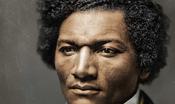text
Informational
Meet Frederick Douglass

Frederick Douglass made an amazing journey from slavery to freedom. Once free, Douglass committed his life to fighting for the freedom of others.
January 7, 2019


